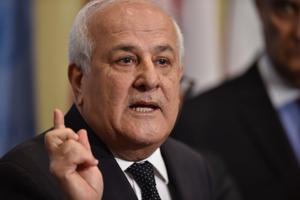 Permanent Observer Mission of the State of Palestine, Riyad Mansour speaks during a press conference after the UN Security Council meeting on May 15, 2018, at UN Headquarters in New York. (
HECTOR RETAMAL / AFP)
Permanent Observer Mission of the State of Palestine, Riyad Mansour speaks during a press conference after the UN Security Council meeting on May 15, 2018, at UN Headquarters in New York. (
HECTOR RETAMAL / AFP)
UNITED NATIONS — Palestine is seeking a position from the UN Security Council in the wake of US President Donald Trump's announcement of a new Middle East peace plan, said Palestine's representative to the United Nations.
UN Secretary-General Antonio Guterres said the world body is committed to its established position of a two-state solution
Palestine is looking for a draft resolution even though it may well be vetoed, Riyad Mansour, the permanent representative of the observer state of Palestine, told a meeting of the Committee on the Exercise of the Inalienable Rights of the Palestinian People.
"We will be seeking a position from the Security Council, a position in the form of a draft resolution that will be before the Security Council," he said.
"We know it will be defeated by a veto. But we want to show that the entire international community is reflecting the same position advocated by all of us and articulated by the secretary-general today again, as he articulated days ago, when this very bad (US) plan was announced in Washington, DC."
READ MORE: Trump offers Mideast plan that Palestinians say is non-starter
UN Secretary-General Antonio Guterres, who presided over Tuesday's meeting of the committee, said the world body is committed to its established position of a two-state solution.
A draft United Nations Security Council resolution on Tuesday condemned an Israeli plan to annex its settlements in the West Bank in a rebuke of Trump’s pro-Israel peace proposal.
The draft text, circulated to council members by Tunisia and Indonesia, would seemingly face a US veto, but nonetheless offered some members’ dim view of the peace plan that Trump rolled out last week with great fanfare.
A US veto at the council level would allow the Palestinians to take the draft text to the 193-member UN General Assembly, where a vote would publicly show how Trump's peace plan has been received internationally.
Josep Borrell, the High Representative of the European Union (EU) for Foreign Affairs and Security Policy, said on Tuesday that the US Middle East peace plan has departed from "internationally agreed parameters".
"The European Union is fully committed to the transatlantic partnership and values all efforts to help find a peaceful resolution to the Israeli-Palestinian conflict," Borrell said in a statement.
Trump on Jan 28 revealed a controversial Middle East peace plan, which calls for a two-state solution while recognizing Jerusalem as Israel's "undivided capital."
Mansour said Palestine is working closely with Tunisia, an Arab state on the Security Council, as well as other council members, for a text.
A document has been circulated to all members of the Security Council, and it is hoped that negotiations will be finished by Thursday or Friday and a draft resolution would be acted on in the Security Council on Feb. 11, when Palestinian President Mahmoud Abbas will be present at the council.
ALSO READ: UNSC to meet over Trump's controversial Mideast plan
"We will be working to have a draft resolution with the strongest possible language and at the same time with the largest support possible in the Security Council," said Mansour.
Trump on Jan. 28 revealed a controversial Middle East peace plan, which calls for a two-state solution while recognizing Jerusalem as Israel's "undivided capital."
The US plan was immediately rejected by the Arab world. In an emergency meeting at the Arab League headquarters in Cairo on Saturday, Arab foreign ministers unanimously agreed to boycott the US plan and not to cooperate "in any way" with Washington in its implementation.
Mansour blasted the US plan again on Tuesday, saying it is "a plan against peace" and "a plan of submission" for the Palestinian people.
With input from agencies


